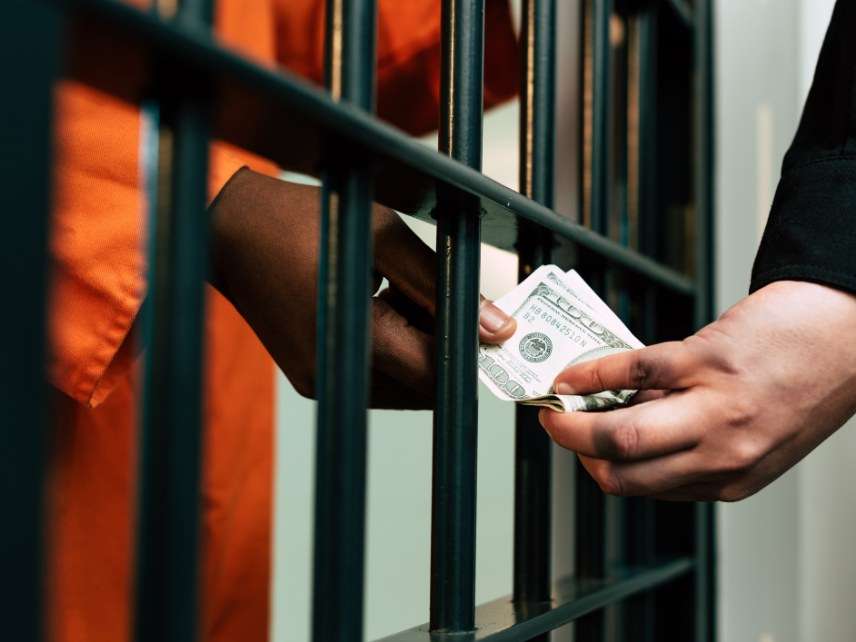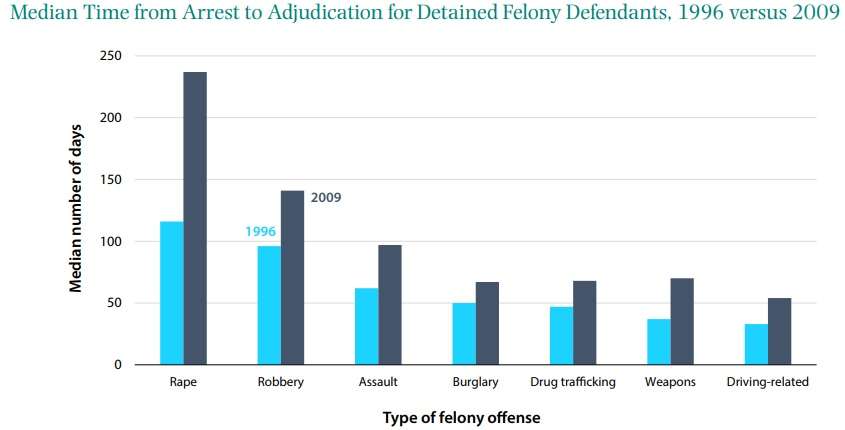Report: Imprisoning People Who Can't Pay Bail Costs America $15 Billion a Year
Taxpayers shell out big time to keep poor folks who haven't even been convicted of crimes behind bars.

America's dependence on cash bail does more than just deprive people of their liberty merely for being accused of a crime; it also costs the rest of us a fortune. Taxpayers are on the hook for keeping hundreds of thousands of people in jail before they go to trial. Meanwhile, those folks are not earning income or otherwise contributing to the economy.
A new report by The Hamilton Project at the Brookings Institution attempts to measure the full financial impact of pretrial detention in the United States. Analysts Patrick Liu, Ryan Nunn, and Jay Shambaugh calculated that pretrial detentions that are the result solely of people being unable to pay bail cost the country $15 billion a year.
They arrived at this figure by looking at the average number of people who are sitting in jails every day who have been offered bail but haven't paid it, typically because they cannot afford it. That's about 412,000 people, nearly a quarter of our incarcerated population. They calculated how much it costs to jail somebody each day. This varies wildly from state to state, but averages out to $77.67 a day, or about $28,000 a year per person.
But there's more. Liu et al. also did their best to calculate out how much money the economy loses due the amount of time somebody spends in jail and is therefore unable to work. That worked out to an average of about $8,590 annually per prisoner. All together, that comes out to $15.26 billion a year.
That's not a terribly useful number in isolation, though it's certainly big (for some context: California has budgeted $12 billion next year for its correctional system). The report also looks at trends of pretrial detention and finds a dramatic increase over a decade of both the number of people being held in jail prior to trial and the amount of time they have to spend waiting for their day in court.
Since the 1990s, the number of people who have been ordered to pay bail (or some other financial obligation) in order to be freed has risen from 53 percent to 72 percent. What's more, pretrial detentions have increased even as total arrests have gone down. Over the same period, both bail amounts and the amount of time spent in jail as a result of being unable to pay bail have increased. The median amount demanded for bail for drug and public order offenses increased by 33 and 48 percent, respectively.
During this timeframe, the amount of time it took between arrest and adjudication for people charged with crimes increased in pretty much every category. Even felony drug crimes can take many more months to resolve then they used to. So people who cannot afford the increasing amounts of money being asked for their freedom are being punished with even longer waits behind bars.

All of those increases mean that people who are kept in jail because they cannot pay are more likely to be convicted. The report's authors looked over several studies and found that in every single one of them, a person who is unable to pay bail is more likely to be convicted than a person who is free before trial, finding in some cases a 14-percentage point difference (and almost all of that difference is due to people pleading guilty). These folks spend an excessive amount of time sitting in a jail cell, which creates tremendous pressure to accept whatever deal is offered to them. Studies also show that folks who can't pay bail end up with harsher sentences and are less likely to see their charges reduced.
The criminal justice system relies on plea agreements to keep the system operating smoothly. Courts don't have the time or resources to put all these people on trial. Putting them in a cell renders them willing to accept whatever the district attorney's office offers (assuming they don't die waiting). Those convictions reduce their employment opportunities and increases the likelihood of committing additional crimes later in life.
In the end, this report highlights the way our pre-trial justice system punishes people simply for being arrested. About 50 percent of those who are released before trial need a commercial bond (as in a bail bondsman) to cover the court's imposed bail. That means they have to pay typically 10 percent to the bondsman to be freed, which is money they never get back. Essentially, they're being ordered to pay a fine to a third party (sometimes in the thousands of dollars) to be released. If they don't, they sit in a jail cell. Either way, they're punished prior to conviction.
Download the full report here. Read Reason's coverage on the push to reform pretrial bail systems here.


Show Comments (12)